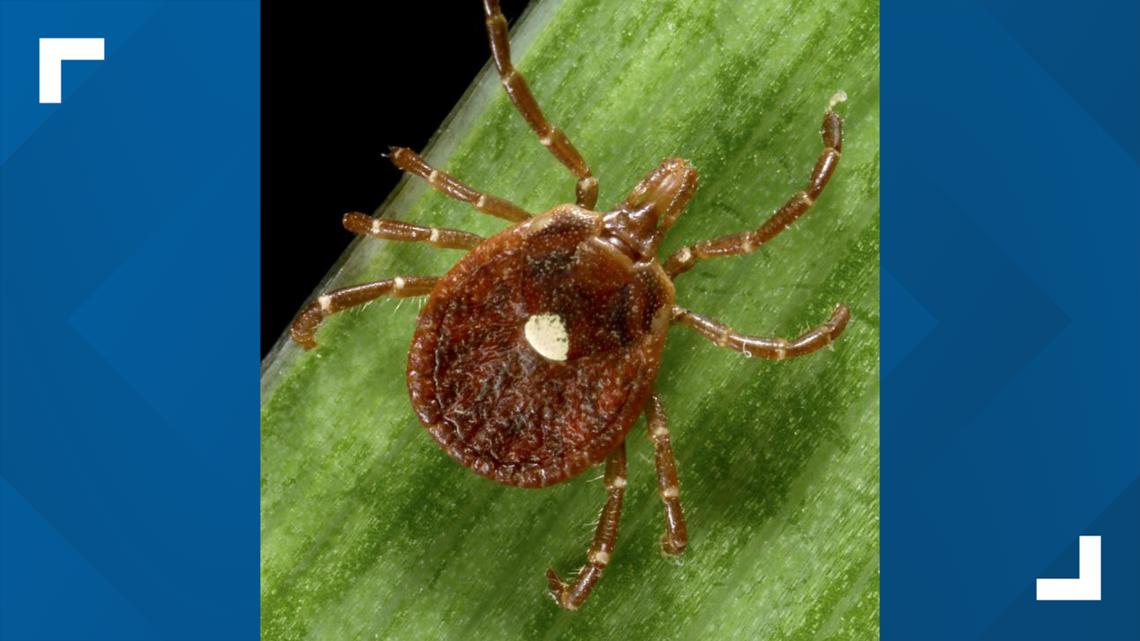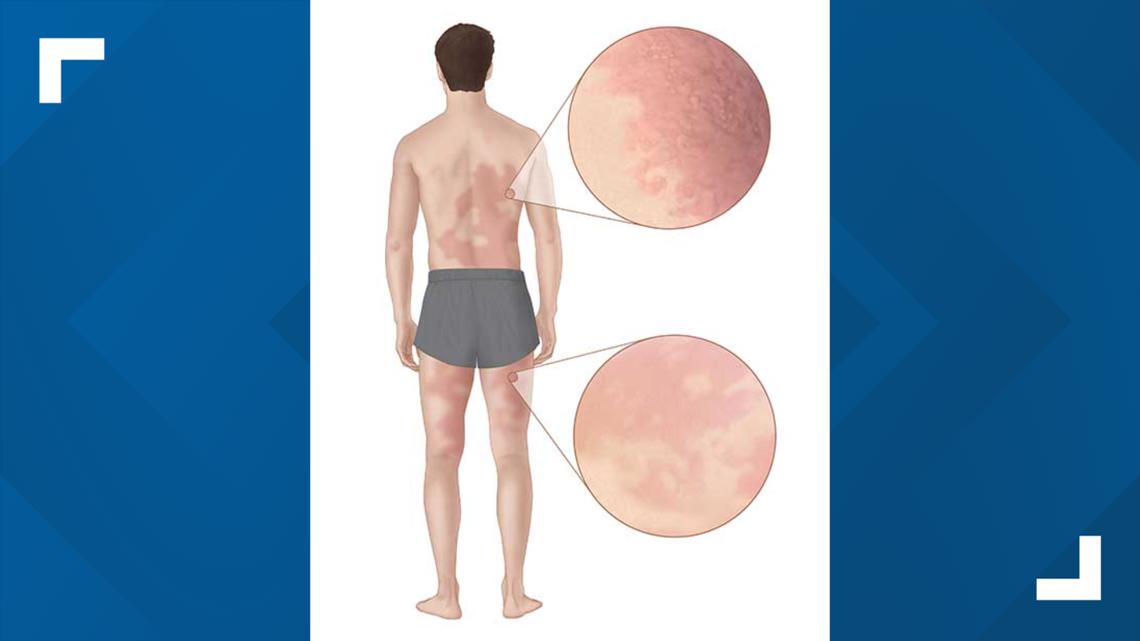CHESAPEAKE, Va. — A food allergy to red meat and other products made from mammals has health officials on high alert. Alpha-gal syndrome (AGS) is a severe condition, and case numbers are on the rise in Virginia.
De Turlington of Chesapeake developed the allergy in 2010.
"I come from a family, and we like meat: pork chops, brisket, barbecue all the time. And so, that has changed," Turlington said. "You learn from trial and error what is safe, what isn't. And I've had a long time to practice now."
Turlington's symptoms have changed over the years, some getting worse. Recently, she's experienced "severe [gastrointestinal] issues, and it is excruciatingly painful," Turlington said.
Turlington first noticed something was wrong after attending her son's Boy Scout camp in the Deep Creek area of Chesapeake.
"I was wearing sandals. I was very naïve in my environment," she recalled. "And I found a little creature tucked away, right between my toes, and that one little creature changed everything."
The little creature was a lone star tick. Researchers say bites from these parasites can lead to the development of AGS.


"[Lone star tick] adults are easiest to identify. They're fairly large -- close to the size of your fingernail or thumbnail -- and the female has a brown body with a white spot right in the middle of it which resembles the state flag for the State of Texas. So, they called it the 'lone star tick' for that reason," said Old Dominion University Professor Emeritus Dr. Daniel Sonenshine.
Renowned for his research of ticks and tick-borne diseases, Dr. Sonenshine said alpha-gal (galactose-α-1,3-galactose) is a type of sugar molecule found in red meat and products made from mammals, like dairy and gelatin. Non-food products, like medications, vaccines, and other medical products may also contain the sugar.
Alpha-gal is also present in the saliva of lone star ticks.
"When a tick bites, they secrete alpha-gal and the human body recognizes it as foreign," Dr. Sonenshine said. "Your immune system will get revved up and try to destroy it."
The chances of developing AGS then grow after eating food that contains alpha-gal.
"You're going to have a hamburger or a beef steak. Now, you're exposed to more, lots and lots of alpha-gal," Dr. Sonenshine said.
As case numbers of AGS rise across Virginia, the Centers for Disease Control and Prevention (CDC) is now calling the condition an emerging public health concern.
"IgE are the antibodies that relate to allergy. The key way of identifying whether a patient has alpha-gal is to look for IgE antibodies to that sugar," said Dr. Thomas Platts-Mills, the University of Virginia professor credited with discovering the connection between AGS and lone star tick bites.
"If you continue to let yourself be bitten by ticks, your antibodies will stay up. But you only get reactions if you eat mammalian meat or cheese or gelatin, which is made from mammals," he added.
However, not everyone who gets bitten by a lone star tick will develop the syndrome.
"A single tick bite will not be sufficient to sensitize you completely," Dr. Sonenshine said, "because it takes time for the immune system to build up a recognition of all these, what we call, immunogenic components of the tick saliva."
But those who do can experience severe symptoms. According to the CDC, reactions can include hives or itchy rash, vomiting, heartburn, diarrhea, cough, and dizziness.


In addition to gastrointestinal issues, Turlington said she's experienced other serious reactions.
"My throat was tightening up. My tongue was swelling," Turlington said. "You kind of get a panic sensation when that happens."
Life-threatening reactions, like anaphylaxis, are also possible.
However, the CDC reports symptoms may not occur until two to six hours after consuming products containing alpha-gal, which can make it difficult to connect the product to the reaction.
"It was too long of a distance," Turlington said. "It took me a while journaling and seeing that every time I've had this happen, it's after I had meat."
Dr. Platts-Mills said the delay in symptoms occurring also makes AGS a challenge for health officials and patients to identify and manage the condition.
"There isn't another form of allergy where you can eat meat and actually get a bad reaction four hours later," Dr. Platts-Mills said. "None of us understood it when we first saw it. Every doctor I've ever spoken to who saw cases before we had the blood test, including myself, didn't believe it."
Dr. Platts-Mills said an allergy that can cause an intolerance to certain foods later in life is also unusual, and that could also pose an issue for proper diagnosis.
"People become tolerant of food," Dr. Platts-Mills said. "And so, the point was that the tick broke that tolerance and changed everything."
A CDC report found more than 110,000 suspected cases of AGS in the U.S. from 2010 to 2022. But experts estimate there could be as many as 450,000 people affected across the country.
Some of the largest case amounts were found in parts of Central and Southwest Virginia. Bedford accounted for the highest numbers in the state.
"[Lone star ticks] don't do well in very, very high humidity, lots of rivers and streams," Dr. Sonenshine said. "They're very abundant in these densely forested localities."
But Hampton Roads residents shouldn't let their guard down. Dr. Sonenshine said the insects have been found in parts of the region. Dr. Platts-Mills said people should also take extra precautions when traveling to places where lone star ticks are more prevalent.
"If you come up to the [Blue Ridge] mountains and you walk in the grass, you can get tick bites easily," Dr. Platts-Mills said.
Researchers are still looking for a cure for AGS, although symptoms can be treated and may eventually lessen or disappear for some people.
In the meantime, Turlington is still adjusting to a new normal.
"I am a diabetic," she said. "The alpha-gal [syndrome] definitely changed my life more than the diabetes, because sometimes, you don't see it coming."
Turlington added, "It's just a day-to-day thing that we have to be aware of... But it is hard 'cause we're still learning."
Dr. Sonenshine said you can lower the risk of developing alpha-gal syndrome by taking steps to avoid tick bites, especially in wooded areas.
Wear long sleeves, long pants, and closed-toe shoes. Opt for light-colored clothing so ticks are easier to see. You can also use tick-repellent sprays before outdoor activities, and be sure to do thorough tick checks before you go back inside.
If you've been bitten by lone star ticks and had reactions after eating or using products containing alpha-gal, call your doctor.

